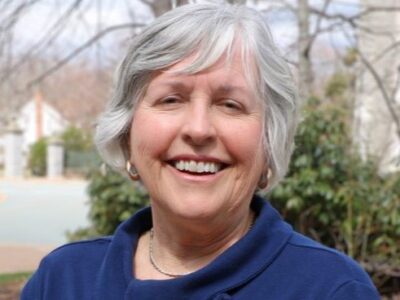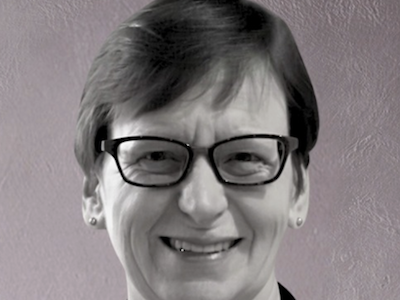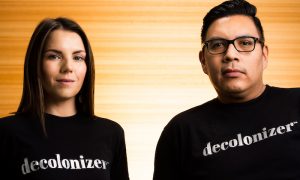 By Katie MacDonald and Tim Fox of Calgary Foundation
By Katie MacDonald and Tim Fox of Calgary Foundation
How do we strengthen relationships with Indigenous communities and enhance our collective work toward reconciliation? This question informs Calgary Foundation’s commitment to reconciliation in accordance with the Truth and Reconciliation Commission’s (TRC) 94 Calls to Action, the United Nations Declaration on the Rights of Indigenous Peoples (UNDRIP), and finally, as signatories to The Philanthropic Communities Declaration of Action.
 In 2016, Calgary Foundation realized the key to providing a lasting impact was to learn about and implement systems-change thinking into our work; this work needed to be weaved into the fabric of the Foundation. In February 2020, a partnership between Candid, Grant Craft and Native Americans in Philanthropy released a case study of Calgary Foundation’s approach, “Changing from the Inside Out: Calgary Foundation’s Journey to Strengthen Relationships with Indigenous Communities.” The study provides important context and history about the Foundation’s reconciliation journey to date.
In 2016, Calgary Foundation realized the key to providing a lasting impact was to learn about and implement systems-change thinking into our work; this work needed to be weaved into the fabric of the Foundation. In February 2020, a partnership between Candid, Grant Craft and Native Americans in Philanthropy released a case study of Calgary Foundation’s approach, “Changing from the Inside Out: Calgary Foundation’s Journey to Strengthen Relationships with Indigenous Communities.” The study provides important context and history about the Foundation’s reconciliation journey to date.
How do we begin? Where do we start?
As a society, we are conditioned to identify a complex issue or problem and immediately find ways to a solution. As an organization, all of us at Calgary Foundation have come to understand it is not that straightforward when attempting to shift a culture or change a system that was built on power and privilege. Even before delving into the Calls to Action, there are insights and context provided in the TRC’s Executive Summary: Honouring the Truth, Reconciling the Future. This context is what Calgary Foundation is drawing on as part of our approach in systems change for reconciliation.
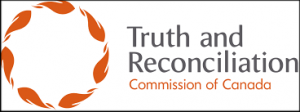 The TRC notes, “Reconciliation is about establishing and maintaining a mutually respectful relationship between Indigenous and non-Indigenous peoples in this country. In order for that to happen, there has to be awareness of the past, acknowledgement of the harm that has been inflicted, atonement for the causes, and action to change behaviour.”
The TRC notes, “Reconciliation is about establishing and maintaining a mutually respectful relationship between Indigenous and non-Indigenous peoples in this country. In order for that to happen, there has to be awareness of the past, acknowledgement of the harm that has been inflicted, atonement for the causes, and action to change behaviour.”
Since 2017, Calgary Foundation has been on a journey to incorporate context and deep-rooted understanding related to the damaging legacy Canadian history has had on Indigenous communities. This type of transformational change requires the Foundation to take a relational as opposed to transactional approach with all stakeholders, including grant recipients.
Grantees as partners
The strategy to expand Calgary Foundation’s relationship with Treaty 7 communities began by increasing awareness and understanding of who made up the Nations of Treaty 7. Over the years, none of the Nations had applied for funding through the Foundation – and this was likely due to a general lack of awareness that the Nations were eligible to receive grants from Calgary Foundation. We knew that building a level of trust would be foundational to our relationships with Treaty 7, and began the slow, yet necessary, process of what would ultimately become ongoing outreach, connection, and convening.
We began researching the Nations that were qualified donees, as per Canada Revenue Agency. The grants team reached out to many of our partners, including surrounding community foundations in southern and central Alberta, to determine which Nations they could support. Through the process, they learned that some foundations had already begun similar work in relationship-building with neighbouring Indigenous communities.
Calgary Foundation continues to meet with elders and community leaders to provide an overview of our work, discuss immediate and emerging community needs, and identify opportunities where we can strengthen relationships and incorporate levels of reciprocity.
Shifting power
An understanding and appreciation of the unique perspective and experience of Indigenous people is now embedded in the granting process, which has ultimately led to changes in our internal practices. As Calgary Foundation looked for ways to share decision-making power with Nations, the focus shifted to prioritizing Indigenous ways of knowing – specifically an emphasis on oral history and culture. This meant shifts like accepting oral/video grant submissions and final reports from Indigenous-led organizations and First Nations communities.
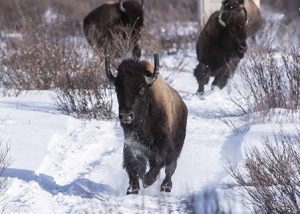 A recent grant to the Blood Reserve in southern Alberta involved the reintroduction of bison. Having the volunteer grant committee sit down with Nation leaders allowed the committee to see the full economic and cultural importance of such an initiative. Sitting in conversation and prioritizing relationships led to the beginning of transformative philanthropy.
A recent grant to the Blood Reserve in southern Alberta involved the reintroduction of bison. Having the volunteer grant committee sit down with Nation leaders allowed the committee to see the full economic and cultural importance of such an initiative. Sitting in conversation and prioritizing relationships led to the beginning of transformative philanthropy.
Committees of volunteers, who broadly represent the Calgary community, review Foundation grant applications. In recent years, part of our journey toward reconciliation and racial equity has involved including more Indigenous volunteers in this grant-review process – another way of putting power back into the hands of the communities we serve.
It’s about the journey
As a community foundation, we have come to understand that there are significant changes needed when it comes to action toward reconciliation, decolonization, and racial equity. We’re working against decades of oppression, racism, discrimination, and genocide. Our very culture has been shaped by this negative history.
How we act and what we believe, as well as the infrastructure of our organizations, came from colonial structures. Therefore, processes for all institutions should be ongoing, not merely be part of a five- or 10-year strategic plan. It has taken generations to get us to where we are, and it will take generations to get us to a place of true social justice. Currently, the scales are tipped in favour of those who have benefitted the most from our societal structures — and there remains much work to be done to find a balance for all community members.
Calgary Foundation is approaching our work on reconciliation and racial equity in much the same way we operate — making it part of our ongoing mandate, in perpetuity, with no end date. Reconciliation and racial equity have become part of our organizational process and culture. Whether it’s a staff member who works with donors creating a giving plan, a board member who oversees the governance of our financial status, or a committee volunteer who reviews grant applications, Calgary Foundation is committed to evaluating how we think, communicate, and learn about Indigenous communities, and we’re determined to inspire others.
Katie MacDonald is the Cultural & Community Engagement Coordinator and Tim Fox the VP of Indigenous Relations & Equity Strategy at Calgary Foundation. Photos of MacDonald & Fox, Calgary, bison and Bow Valley are courtesy of Thunder Boy Photography, Igor Kyryliuk (Unsplash), Calgary Foundation, and Grapher78 (Wikimedia).
Sunday, October 24, 2021 in For homepage, Fundraising, Indigenous series, Social Justice & Change
Share: Twitter, Facebook

